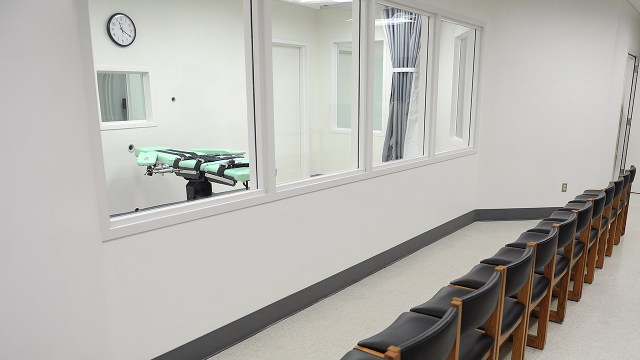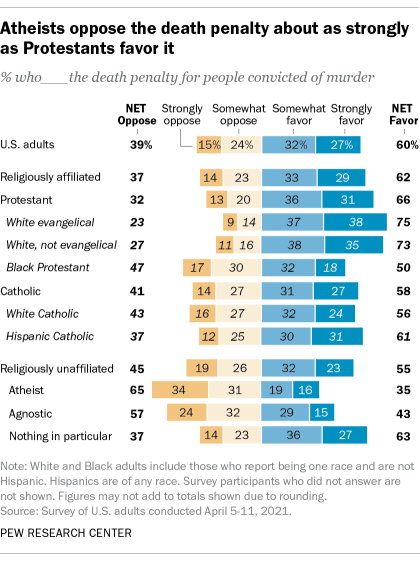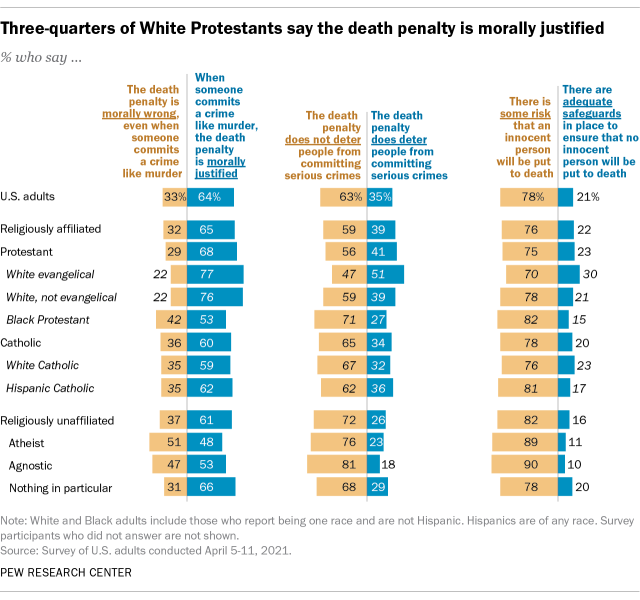
A majority of adults in the United States favor the death penalty for people convicted of murder, according to a recent Pew Research Center survey. However, views about the death penalty vary by religion – with atheists and agnostics opposing this form of punishment at about the same rate as Americans overall support it.
Roughly two-thirds of atheists (65%) and six-in-ten agnostics (57%) either “strongly” or “somewhat” oppose the death penalty for people convicted of murder. Atheists and agnostics are small religious groups, representing less than 10% of the adult population, but their share has grown in recent years.
Meanwhile, 60% of U.S. adults overall favor the death penalty, including 75% of White evangelical Protestants and 73% of White non-evangelical Protestants, according to the survey, which was conducted in early April. White Protestants account for about 29% of the U.S. population, a share that has shrunk in recent years.
Pew Research Center conducted this analysis, using data from a survey of 5,109 U.S. adults fielded April 5 to 11, 2021, to better understand how Americans’ views about the death penalty vary by religion. Everyone who took part in this survey is a member of the Center’s American Trends Panel (ATP), an online survey panel that is recruited through national, random sampling of residential addresses. This way nearly all U.S. adults have a chance of selection. The survey is weighted to be representative of the U.S. adult population by gender, race, ethnicity, partisan affiliation, education and other categories. Read more about the ATP’s methodology.
Here are the questions used for this report, along with responses, and its methodology.
Atheists and agnostics are the only religious groups in this analysis that are more likely to oppose the death penalty than to support it. Groups with majorities in favor of executing convicted murderers include Hispanic Catholics (61%) and people who describe themselves, religiously, as “nothing in particular” (63%). Black Protestants are divided in their views on the death penalty, with 50% in favor and 47% opposed, mirroring a broader trend of lower support for the death penalty among Black Americans overall.
Due to sample size limitations, this analysis does not include some smaller religious groups, including Jewish and Muslim Americans.
Views of the death penalty also differ by political orientation, race and age – characteristics that tend to vary between religious groups. For example, atheists are younger and more politically liberal than White evangelicals on average. Still, while these differences account for some of the variation across religious groups, religious differences in support for the death penalty remain even after accounting for these other traits.
In addition to exploring levels of support for the death penalty, the survey asked respondents whether they feel this form of punishment is morally justified, whether it acts as a deterrent, whether there are adequate safeguards to ensure that no innocent person is put to death, and whether sentencing for the same crime varies by race.
Again, on several of these questions, atheists and agnostics fall on one end of the spectrum and White Protestants on the other. Roughly half of atheists (51%) and agnostics (47%) say the death penalty is morally wrong, even for people who commit crimes like murder. Fewer than half as many White Protestants (22%) – evangelical and not evangelical – feel the same way, with more than three-quarters in these groups saying the death penalty is morally justified when someone commits a crime like murder.
White evangelical Protestants are also the only religious group in which a plurality (51%) say the death penalty deters people from committing serious crimes. By comparison, about half as many Black Protestants (27%) believe the death penalty acts as a deterrent. Generally speaking, people with any religious affiliation are more likely than those without one to say that the threat of the death penalty deters serious crimes: 39% of affiliated adults say this, compared with 26% of the unaffiliated.
Large majorities in every religious group say there is some risk that an innocent person will be put to death. However, White evangelical Protestants are more likely than any other group analyzed to say there are adequate safeguards in place to ensure that no innocent person will be put to death, with three-in-ten taking this position. Among religiously unaffiliated Americans, only about one-in-ten atheists and agnostics say adequate safeguards are in place to prevent innocent people from being executed. Unaffiliated people who say their religion is “nothing in particular” are twice as likely to say the same (20%).
There also are wide differences over whether the death penalty is applied equally by race. About nine-in-ten Black Protestants (88%) say Black people are more likely than White people to be sentenced to death for committing similar crimes, while nearly seven-in-ten White evangelicals (68%) say that White and Black people are equally likely to be sentenced to death. Roughly half of White non-evangelicals (53%) and Catholics (47%) believe the death penalty is applied equally between these two races.
Note: Here are the questions used for this report, along with responses, and its methodology.


